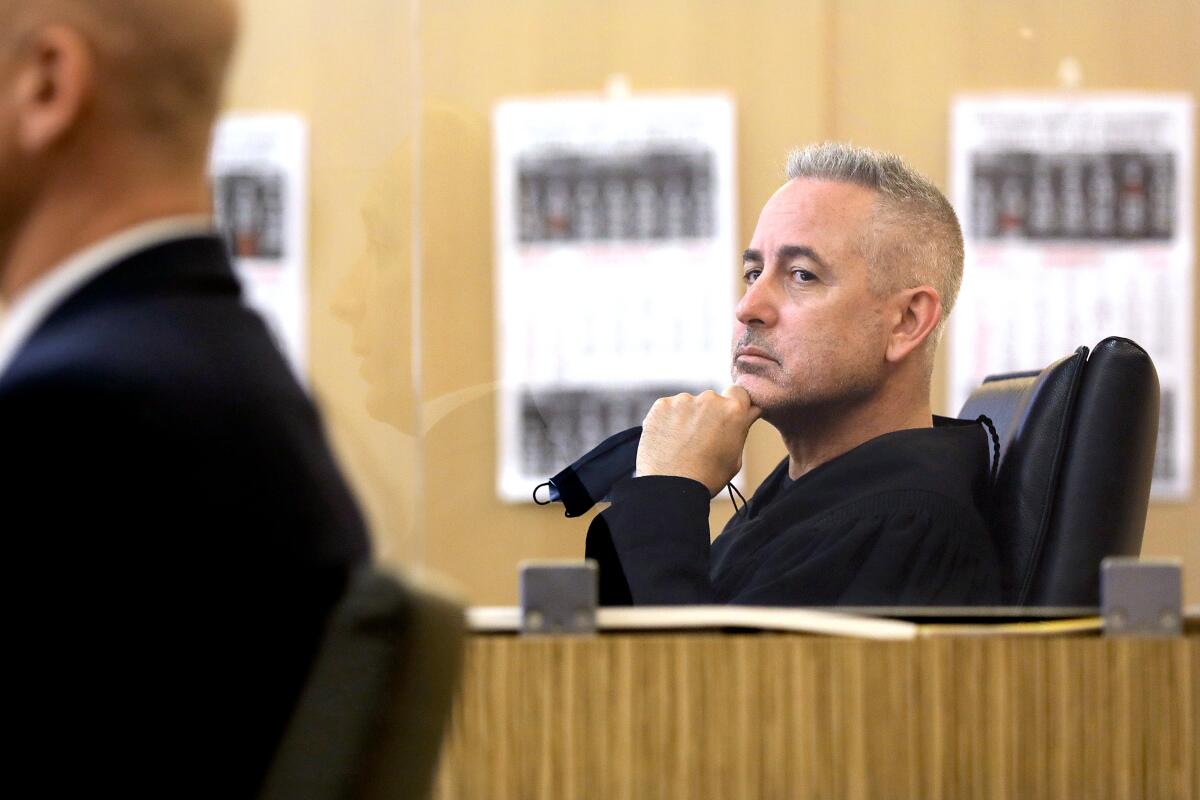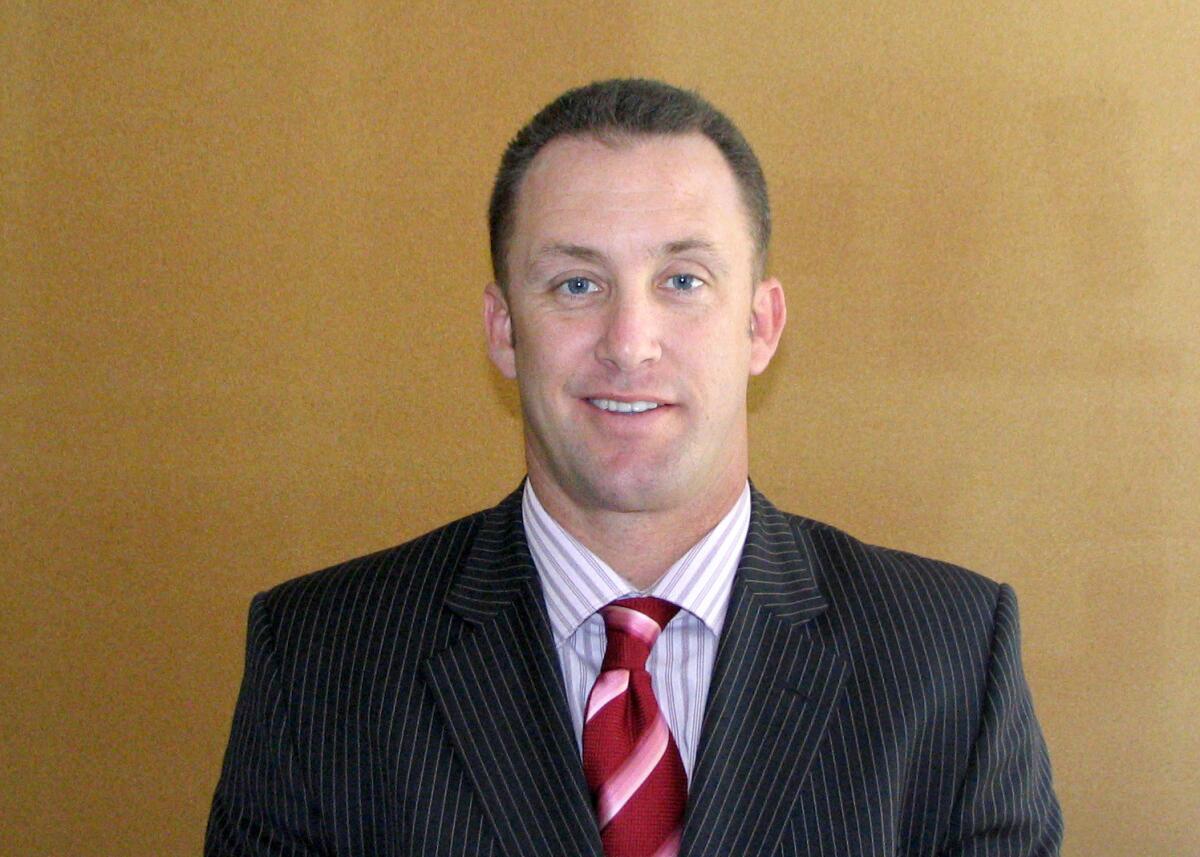How a convicted murderer’s bid for freedom sparked a fight between L.A. County judges

- Share via
When he sought to make the leap from prosecutor to judge in 2008, Patrick Connolly branded himself to voters as a hard-charging and hard-partying attorney who had won some of the most complicated murder cases in Long Beach between sleepless trips to Las Vegas.
Months before he was elected to the bench, Connolly sent Frank Gonzalez and Justin Flint to prison for the rest of their lives. He’d won murder convictions against them in the killing of off-duty Los Angeles County sheriff’s Deputy Maria Rosa.
At trial, Connolly accused Gonzalez of firing the shot that felled Rosa, who was 30 at the time of her slaying in 2006. But Flint was also convicted of murder because he was involved in the robbery that led to her death.
Earlier this year, Flint’s case resurfaced in the same Long Beach courthouse where Connolly once worked. Due to a 2019 change in the state’s felony murder law, Flint is arguing he should not have been convicted of murder because he didn’t shoot Rosa, court records show.
As L.A. County Superior Court Judge Daniel Lowenthal was weighing the case — including the discovery of information that arguably should have been turned over to Flint more than 15 years ago — he received a motion to disqualify him from hearing the proceedings.
The motion wasn’t written by the prosecutor in the case. Its author was Connolly, his fellow justice.
This rare instance of judicial infighting has raised alarm bells with ethics experts and sparked a face-off between two of the more outsize personalities in L.A. County’s legal system, all while the due process rights and the potential freedom of a convicted cop killer hang in the balance.
Both judges were barred from commenting for this article because of California rules governing judicial behavior. But in his motion to disqualify Lowenthal, Connolly accused his fellow judge of being biased against law enforcement and claimed Lowenthal’s rulings could hurt Connolly’s stature as a judge.
Connolly feared any ruling that suggested evidence was mishandled in the original trial would be tantamount to a finding of misconduct against him, according to his filing.

Legal experts said Connolly’s decision to take action in a case he once prosecuted was unprecedented and might run afoul of ethical guidelines for judges. Especially because the current prosecutor assigned to the case has raised no concerns about Lowenthal.
“I’m having a really hard time getting around the fact that one judge is trying to interfere with another judge’s cases, and it brushes up against the ethical rules,” said Laurie Levenson, a former federal prosecutor and professor at Loyola Law School in Los Angeles. “Connolly may have many arguments substantively in his favor, but he’s not allowed to do what he did.”
“He’s a sitting judge,” she continued. “He’s actually not allowed to comment on a pending case … it sounds like he just wants for his own personal or political reasons to be able to have a public response to another judge’s decisions.”
The son of longtime Long Beach congressman Alan Lowenthal, Daniel Lowenthal is often privately grumbled about by prosecutors who see him as more criminal justice reform activist than jurist.
Last year, he drew criticism after he declared a mistrial because the Sheriff’s Department kept a defendant in abhorrent sleeping conditions for days, ruling the man was too tired to aid in his own defense. On the bench since 2007, Lowenthal is up for reelection next year.
A Superior Court judge declared a mistrial Wednesday in a case against a man facing life in prison because the Sheriff’s Department held him in cells without beds or blankets for two nights.
Connolly has a reputation for making brash remarks, both on and off the bench. He bragged about Las Vegas trips and courthouse romances to a local paper when he was running for office. Comments he’s made toward attorneys and defendants while in robes have earned him multiple admonishments by the California Commission on Judicial Performance.
The two were drawn into each other’s orbit last year, when Flint’s resentencing petition landed in Lowenthal’s court. While preparing to argue against the petition, Deputy Dist. Atty. Mary Murray discovered a transcript of an interview between Long Beach police investigators and a confidential informant named Glenn Gosnell that was conducted months after the shooting, court records show.
Gosnell told police that he had spoken to Gonzalez, a friend, shortly after the shooting. Gonzalez admitted to killing Rosa, Gosnell said, but the gunman insisted Flint was “down the street” and acting as a lookout at the time, court records show.
That information could prove relevant to Flint’s bid for release, as he would be ineligible for resentencing if he knew Rosa was a law enforcement officer at the time of the crime under California’s revised felony murder rule.
Although Rosa was off-duty, prosecutors say she was wearing her badge, and it was visible. While witnesses reported seeing two men in the area before the shooting and one fleeing after abandoning a bike in the area, no one actually saw the fatal gunfire.
Connolly presented the Gosnell interview to the judge presiding over Flint’s initial trial, who decided it did not need to be turned over. But earlier this year, Lowenthal disagreed.
“It unquestionably appears that the fairness of the trial was compromised by the State’s failure to disclose the Gosnell interview to the defense,” Lowenthal wrote in an order in March calling for a hearing on what he termed a potential Brady violation, referring to a 1963 U.S. Supreme Court ruling that requires prosecutors to provide defendants with potentially exculpatory evidence.
An L.A. Superior Court judge was admonished for a third time Friday by a judicial watchdog group. His latest offense: inappropriate demeanor and an improper remark.
Legal experts said it would be a stretch to consider Connolly responsible for any Brady violation, because he presented the Gosnell information to a judge. But they also said the initial judge’s ruling was incorrect, as the Gosnell interview was favorable to Flint’s defense and should have been turned over.
Before that Brady hearing could take place, Connolly filed his motion to get Lowenthal tossed off the case. He argued that Lowenthal had pre-judged the matter and was biased against law enforcement because of Facebook posts he wrote in 2020, during the mass protests and calls for criminal justice reform that followed the murder of George Floyd.
“It is time to build a better and fairer system. One that reallocates money from our prison system and invests in jobs, health and education. One that prioritizes diversion,” Lowenthal wrote in 2020, in the messages Connolly alleged show bias. “One that stops using prisons to deal with poverty and mental illness. And one that stops imposing absurdly long prison sentences that lack a public safety rationale.”
In a response to Connolly’s motion, Lowenthal said he received clearance from the California Judges Assn. to make the posts. The association’s executive director said such discussions are private and declined to comment.
Connolly also argued that Lowenthal had erred by ordering a hearing to determine if a Brady violation occurred in the original case because Flint’s attorney, Edmont T. Barrett, was only seeking resentencing for his client.
“The People did not commit a Brady violation ... Judge Lowenthal improperly called the non-disclosure order ‘inexplicable’ and ‘beguiling,’” read Connolly’s motion. “Disqualification is mandatory because the public can have no confidence in the fair resolution of this proceeding. Judge Lowenthal has made up his mind.”
In court, Murray also questioned whether Lowenthal had the legal option to weigh the Brady issue, but Lowenthal rejected her argument, records show.
Harvinder Anand, Connolly’s attorney, declined to comment because the underlying Flint case is still pending. Murray did not respond to a request for comment.
Scott Cummings, a professor of law and legal ethics at UCLA, said some of Lowenthal’s comments that appeared to prejudge the admissibility of Gosnell’s statements were in bad form.
But Cummings also said it was clear Connolly filed his motion to disqualify because he had a personal stake in the case. He also dismissed the idea that Lowenthal’s social media posts evidenced bias.
“It seemed like a stretch, and even with respect to the prejudging comments, it seems to me highly unlikely that any judge that did not have a stake in the case would ever raise that as a potential basis for disqualification,” Cummings said.
Orange County Superior Court Judge Cheri Pham quickly rejected Connolly’s disqualification motion, noting he did not have standing. But she also said Gosnell’s interview would have been relevant to the initial trial because his statements might have impeached Connolly’s closing arguments.
“The prosecutor asserted a position inconsistent with the information provided by the Informant, arguing Flint was with Gonzalez and participated in the struggle with Rosa and saw her badge before the shooting,” Pham wrote.
Lowenthal will oversee hearings next month to determine whether a Brady violation took place.
If Flint wins his petition, he would likely be released. He has already served far more time in prison than he could have been sentenced to for the only other count he was convicted of, attempted robbery, Barrett said.
It is unclear, however, if the revelation of the Gosnell interview would be enough to set Flint free.
Rosa was on her way to work at the Twin Towers Correctional Facility on the morning of March 28, 2006, when she was approached by Gonzalez in the 2900 block of Eucalyptus Avenue. Prosecutors alleged Gonzalez and Flint were riding past on bicycles, looking for people to rob to feed their drug habits.
Gonzalez allegedly confessed to his girlfriend that he shot Rosa, and he was also recorded bragging about the shooting during an undercover jailhouse sting operation. His DNA was also matched to a bicycle abandoned at the scene.
Flint was never accused of firing a gun at Rosa. He was convicted of murder solely based on the fact that he took part in the attempted robbery that led to her death. Prosecutors have previously argued that Flint should have been able to see Rosa’s Sheriff’s Department uniform in the open trunk of her car during the robbery.
Officials say the pair tried to rob the woman as she left for work in March. Mystery had shrouded the case.
But at the time of the shooting, then-Long Beach Police Chief Anthony Batts told reporters that Rosa was dressed in jeans and a sweatshirt and “could have been any woman going to work in the early hours.”
Connolly’s filing also points to recorded conversations after the shooting in which Flint could be heard asking “why couldn’t the b— just give up the god— wallet, man?” implying he was directly involved in the robbery and would have seen Rosa’s badge. Flint also testified at trial that he was roughly 27 feet away from Rosa, arguably closer than the “down the street” description Gosnell gave, records show.
Murray is opposing Flint’s motion for resentencing, according to Tiffiny Blacknell, director of communications for the Los Angeles County district attorney’s office. The prosecutor is expected to present “evidence that Flint did know the victim was a police officer, making him ineligible for resentencing,” Blacknell said.
Blacknell said the office agreed with Pham’s ruling and that Lowenthal had “been an impartial and fair bench officer” throughout the proceedings.
Between the two judges, Connolly is the only one who has faced sustained findings of misconduct for behavior on the bench, according to records kept by the state Commission on Judicial Performance.
In 2021, Connolly was rebuked by the state board for mistreating two attorneys who appeared remotely early in the COVID-19 pandemic. In another incident, Connolly was cited for bias by the commission when he told a defendant he believed the man was guilty shortly after a jury acquitted the defendant.
“Judge Connolly’s remark was likely to undermine public confidence in the independence of the jury and its important role in the justice system,” the admonishment read, ironically echoing Connolly’s claims of impartiality against Lowenthal.
A California agency overseeing judges’ discipline censured a Los Angeles County judge Wednesday, saying he had abused his authority and mistreated a defense attorney.
Connolly has also faced prior admonishments for “abuse of authority” after he threatened a defense attorney, Freddie Fletcher, with contempt hearings that he never scheduled. Connolly also contacted a different judge to obtain information against the lawyer, according to the commission, which found Connolly was “conducting an independent investigation into Mr. Fletcher’s conduct, and was embroiled in the matter and biased against Mr. Fletcher.”
With many ex-prosecutors manning L.A. County’s judicial benches, Levenson said Connolly’s conduct could set a dangerous precedent.
“We have so many judges who have come from the ranks of prosecutors. Does that mean whenever their cases are reviewed and uncomfortable things are said, they can go after the judge?” she asked. “He kind of has to stay in his lane.”
More to Read
Sign up for Essential California
The most important California stories and recommendations in your inbox every morning.
You may occasionally receive promotional content from the Los Angeles Times.













